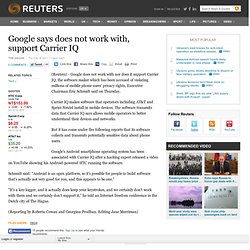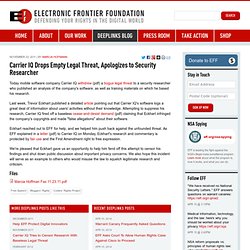

Lawmakers seek hearing on Carrier IQ privacy issues. News January 12, 2012 03:31 PM ET Computerworld - The Carrier IQ privacy controversy shows little signs of letting up, as three lawmakers today called for a Congressional hearing on the implications raised by the use of the company's software by wireless carriers.

Reps. Henry Waxman (D-CA), G.K Butterfield (D-NC) and Diana DeGette (D-CO) sent an open letter (download PDF) to Rep. Fred Upton (R-MI), chairman of the House Energy and Commerce Committee, asking for an investigation of the data collection and transmission capabilities of Carrier IQ's software and similar products. The letter, sent to Upton and two other subcommittee chairs, also asked Congress to find out whether Android phones were sold with security problems that would have exacerbated the problems caused by Carrier IQ's software.
"Data collection and transmission by Carrier IQ and similar software is widespread, and consumers appear to have little knowledge and even less control over the practice," the three lawmakers wrote.
Don't Spy on Me. EFF takes the fight to Carrier IQ, requests reinforcements. Carrier IQ defense. Carrier IQ admits to collecting text messages. Carrier IQ, the mobile intelligence provider at the centre of a US privacy storm, has said it inadvertently collected some SMS messages as the result of a software bug.

FBI tracking mobile data. Google says does not work with, support Carrier IQ. THE HAGUE Thu Dec 8, 2011 7:14pm GMT THE HAGUE (Reuters) - Google does not work with nor does it support Carrier IQ, the software maker which has been accused of violating millions of mobile phone users' privacy rights, Executive Chairman Eric Schmidt said on Thursday.

Carrier IQ Drops Empty Legal Threat, Apologizes to Security Researcher. Today mobile software company Carrier IQ withdrew (pdf) a bogus legal threat to a security researcher who published an analysis of the company's software, as well as training materials on which he based his research.

Last week, Trevor Eckhart published a detailed article pointing out that Carrier IQ's software logs a great deal of information about users' activities without their knowledge. Attempting to suppress his research, Carrier IQ fired off a baseless cease-and-desist demand (pdf) claiming that Eckhart infringed the company's copyrights and made "false allegations" about their software. Eckhart reached out to EFF for help, and we helped him push back against the unfounded threat. 12/7 - What's Wrong with SOPA? Is Carrier IQ spying on you? Hidden software in your smartphone might be spying on you.

Until an uproar this week, chances are you had never heard of a company called Carrier IQ, but if you own a smartphone, it's possible this little California company has collected lots of information about you. Carrier IQ makes software that has been pre-installed on mobile phones used by millions of consumers. "It is installed by the wireless carriers like Sprint and AT&T," says Chris Soghoian, a security and privacy researcher at Indiana University. "It is insanely difficult to remove.
In fact, you probably have to violate your warranty and perform the equivalent to a lobotomy to remove it from your device. " The software is supposed to provide the wireless carriers with diagnostic information on the ways that consumers are using their phones. "So this could be your signal strength, how many calls are dropped. However, Trevor Eckhart, a 25-year-old software developer, posted this video: Carrier IQ and Facebook pose the least of your privacy threats. There's plenty of rightful indignation over the revelation that AT&T and Sprint have installed monitoring apps (purportedly to detect network and performance issues) on the millions of cellphones and smartphones they sell, using software from a company called Carrier IQ.

But technologies such as Carrier IQ, GM's continued tracking of OnStar customers who had cancelled service, and the tracking software used by some malls over the Thanksgiving holidays are relatively benign compared to what people are not talking about: software and devices that not only monitor individuals but feed that data to insurers and others who could use it to determine rates, deny coverage, and otherwise control people's behavior. This year has seen much teeth-gnashing over anonymized tracking tools such as Carrier IQ, the capture of smartphone location information, and the mall-tracking devices. Despite the uproar, these technologies don't invade individual privacy because they don't know who the person is.
Carrier IQ downplays 2010 patent request. News December 6, 2011 06:11 AM ET.

Carrier IQ Speaks: 5 Key Takeaways. As the Carrier IQ scandal continues to heat up — now with even more lawsuits — the company has chosen to break its silence by speaking with the press.

Dieter Bohn and Sean Hollister from The Verge managed to score a big interview with Carrier IQ VP Andrew Coward. Coward reaffirms Carrier IQ's earlier statements, maintaining that the company isn't violating any wiretapping laws or doing anything untoward but he also manages to open up a bit more about exactly what Carrier IQ does do and why. The entire interview is well worth the read — and our kudos to Bohn and Hollister for securing such a win — but we were struck by a few aspects of the conversation. 1. Carrier IQ interview: inside the brave new world of carrier phone tracking. 25inShare Jump To Close By Sean Hollister and Dieter Bohn You may have heard of the "internet of things," a vision of the future where cheap sensors are everywhere, and they allow machines to automatically track everything at all times.
Over the last few days, we got an eye-opening look into that future thanks to a company called Carrier IQ.
Carrier IQ: It’s totally rational to worry that our phones are tracking everything we do. Carrier IQ hit with privacy lawsuits as more security researchers weigh in. Carrier IQ, the new poster child for (alleged) smartphone privacy violations, has been hit with two class-action lawsuits from users worried about how the company's software tracks their smartphone activity.

Carrier IQ, of course, professes its innocence. But the company has also received some public support from security researchers who say Carrier IQ's software is only tracking diagnostic information and likely is not violating user privacy. It all began recently with a developer named Trevor Eckhart showing how Carrier IQ software seems to record button presses, search queries and the contents of text messages on an HTC Evo Android phone, with no way for the user to shut the tracking activity off.
Carrier IQ initially tried to silence Eckhart with a cease-and-desist letter, but ultimately backed down on the threat in the face of opposition from the Electronic Frontier Foundation. Privacy under threat: Software on cellphones that helps surveillance. San Fransisco: Technology bloggers are asking if our cellphones are spying on us after a security researcher said a piece of software hidden on millions of phones was recording virtually everything people do with them. Amid a broad outcry, Sen Al Franken is calling for an investigation.
A class-action lawsuit has been filed against the software’s maker, Carrier IQ Inc of Mountain View, California The software, which Carrier IQ says is used on some 150 million mobile devices, appears relatively innocuous. It does watch what owners of Sprint Nextel Corp and AT&T Inc smartphones do with them, including what people type and the numbers they dial. But it doesn’t seem to transmit every keystroke to the company. “It is software that is developed in partnership with carriers with the intent to improve network performance. Carrier IQ Speaks: Our Software Ignores Your Personal Info - John Paczkowski - Mobile. Carrier IQ, maker of a network diagnostic tool installed on millions of smartphones, has a simple rebuttal to accusations that its software logs keystrokes on the devices on which it is installed: It doesn’t. While CIQ might “listen”* to a smartphone’s keyboard, it’s listening for very specific information.
Company executives insist it doesn’t log or understand keystrokes. It’s simply looking for numeric sequences that trigger a diagnostic cue within the software. If it hears that cue, it transmits diagnostics to the carrier. So, for example, if during a support call a technician asks a customer to enter a short code, CIQ will be listening for it; when it’s entered, CIQ will relay the appropriate diagnostic information to the carrier. “The software receives a huge amount of information from the operating system,” Andrew Coward, Carrier IQ’s VP of marketing, told AllThingsD.
Okay. “If there’s a dropped call, the carriers want to know about it,” says Coward. I Know My Phone's "Spying" on Me, But How Bad Is It? Dear Lifehacker, With all the hullaballoo about Carrier IQ spying on all those phones, I'm left wondering what else is my phone gathering about me? Should I be concerned, and if so, what should I do about it? P Signed, Not Trying To Be ParanoidP Dear NTTBP, A healthy dose of skepticism is, well, healthy, and you're definitely not alone in wondering what kind of private information your phone is gathering and what's being done with it.
The CarrierIQ rootkit is the most recent of many mobile privacy and security concerns that have been raised (though particularly worrisome because it comes preinstalled on your phone, and removing it can be difficult). Your Cell Phone Knows Where You AreP. Carrier IQ, Mobile Services Grilled over Spyware Charges. Carrier IQ, the mobile diagnostic company recently accused of installing rootkits on more than 140 million devices worldwide, says it's using its software for good, not evil. But some critics suggest CIQ's software may violate federal wiretap laws, a charge CIQ vehemently denies.
Meanwhile, the mobile industry including device makers and carriers are trying to put as much distance as possible between their products and Carrier IQ. Congress is also getting on in the action with Senator Al Franken (D-Minnesota) demanding that CIQ explain its business practices within the next 12 days. How We Got Here In mid-November, security researcher Trevor Eckhart published a report accusing CIQ of installing malware on more than 140 million devices worldwide. Programmer Raises Concerns About Phone-Monitoring Software. 7:18 p.m. | Updated Adding comment from Apple. 8:00 p.m. | Updated Adding new comment from Carrier IQ. 10:42 p.m. | Updated Adding analysis from security experts.
A viral Internet video has raised privacy concerns about an obscure piece of data-collection software that is embedded in millions of cellphones. In his video, Trevor Eckhart, a 25-year-old programmer, indicates that a software utility called Carrier IQ may be quietly logging much of a phone user’s activity, including keystrokes, numbers dialed, encrypted Web searches and the contents of text messages. “Every button that you press in the dialer, before you even call, already gets sent off to the IQ application here,” Mr. The video has reopened a discussion of whether phone companies and their partners are collecting more data about customers than necessary to provide their services.
When Mr. Sen. Franken Wants Answers from Companies Who Install Carrier IQ Software on Smartphones. Carrier IQ, HTC, Samsung sued for alleged wiretapping. HTC and Samsung targets of privacy class actions. US senator calls for answers on phone 'snooping' Translation From Corporate Jargon Doublespeak to English of Carrier IQ's 'Media Alert' Thursday, 1 December 2011 Said “Media Alert” is available in convenient PDF format here. Measuring Mobile User Experience Does Matter! We Got Caught Doing Something We Were Kind of Hoping No One Would Notice and Now We’re Nervously Placing Exclamation Marks at the End of Our Media Alert Headlines! Carrier IQ would like to clarify some recent press on how our product is used and the information that is gathered from smartphones and mobile devices.
So, there's a rootkit hidden in millions of cellphones. [UPDATE: According to a statement from Apple, the company stopped supporting Carrier IQ with iOS 5.0 on most of its devices, but the iPhone 4 still uses it.] iPhone owners: Here's how to disable the collection of diagnostic information on your handset. So, it seems that there is a rootkit hidden in millions of Android, Symbian, BlackBerry, webOS and even iOS handset that logs everything we do. [UPDATE: According to Nokia, 'CarrierIQ does not ship products for any Nokia devices.'